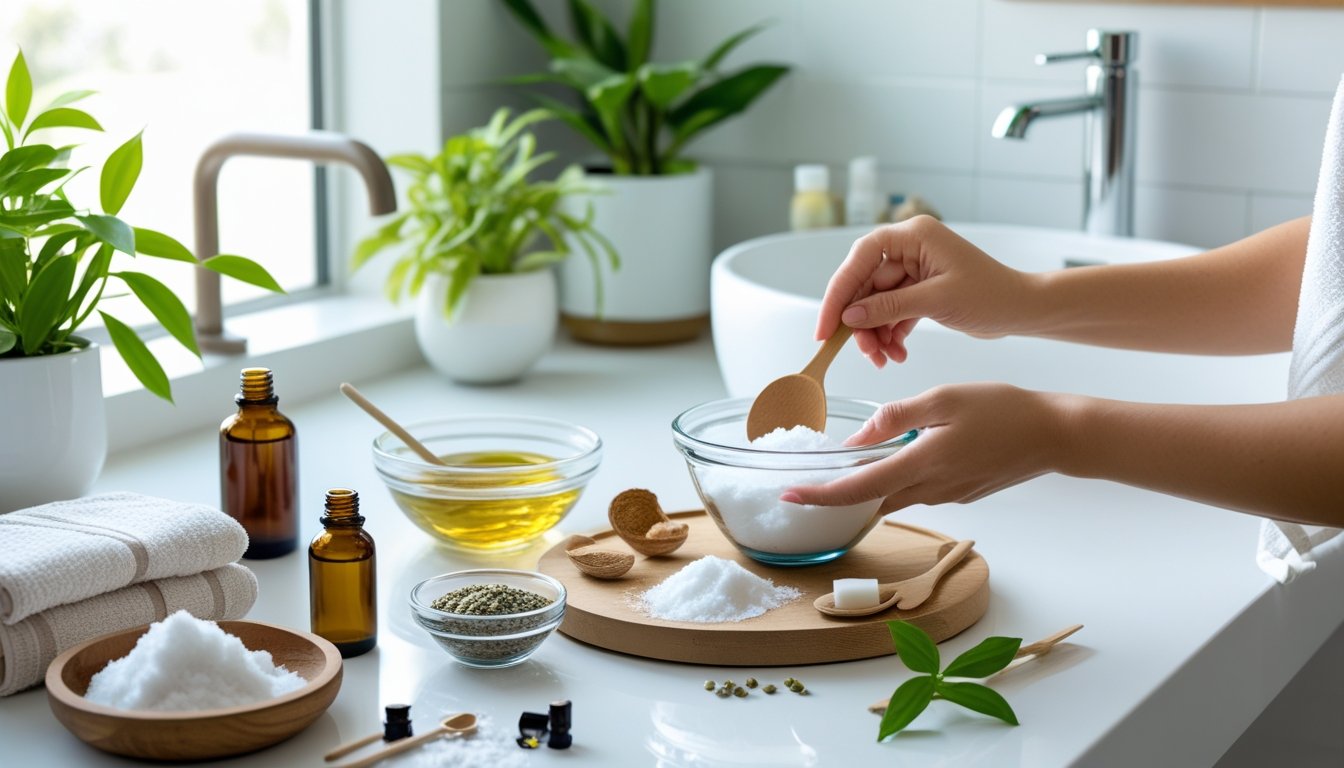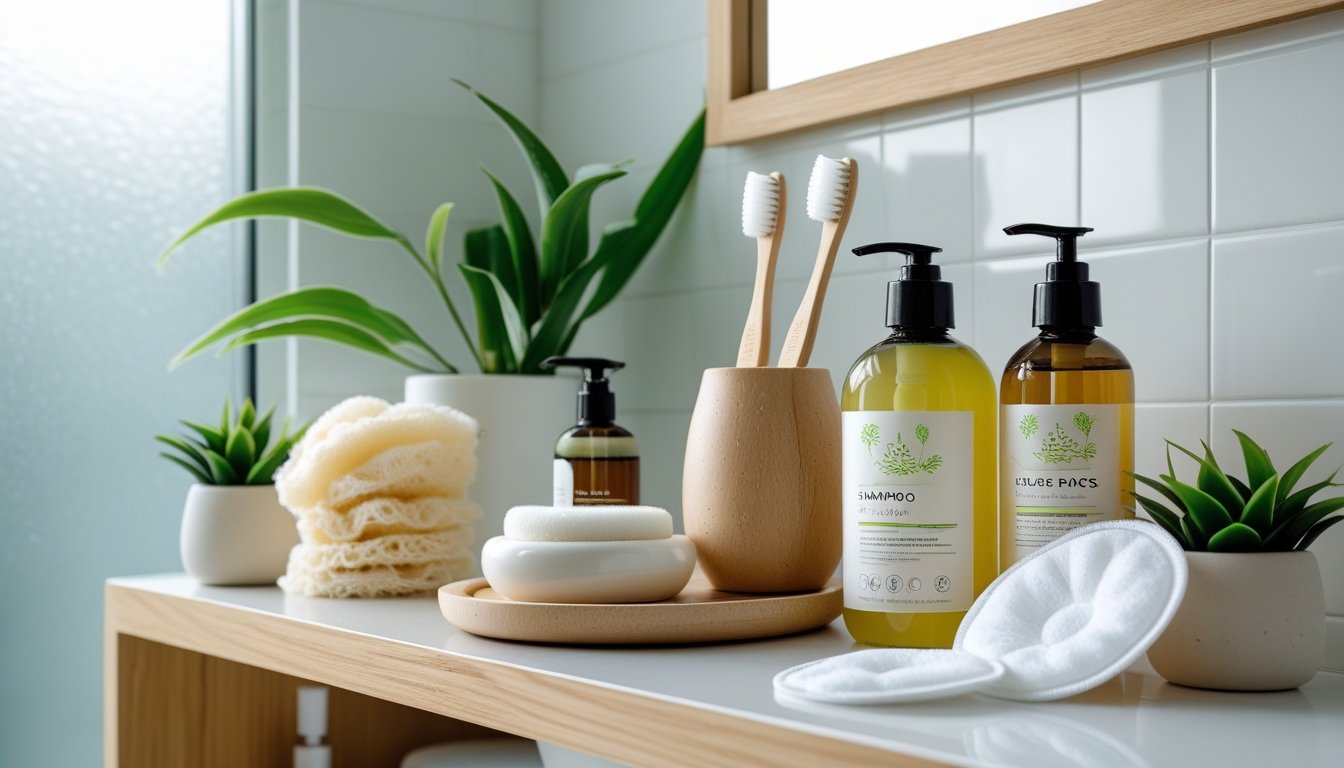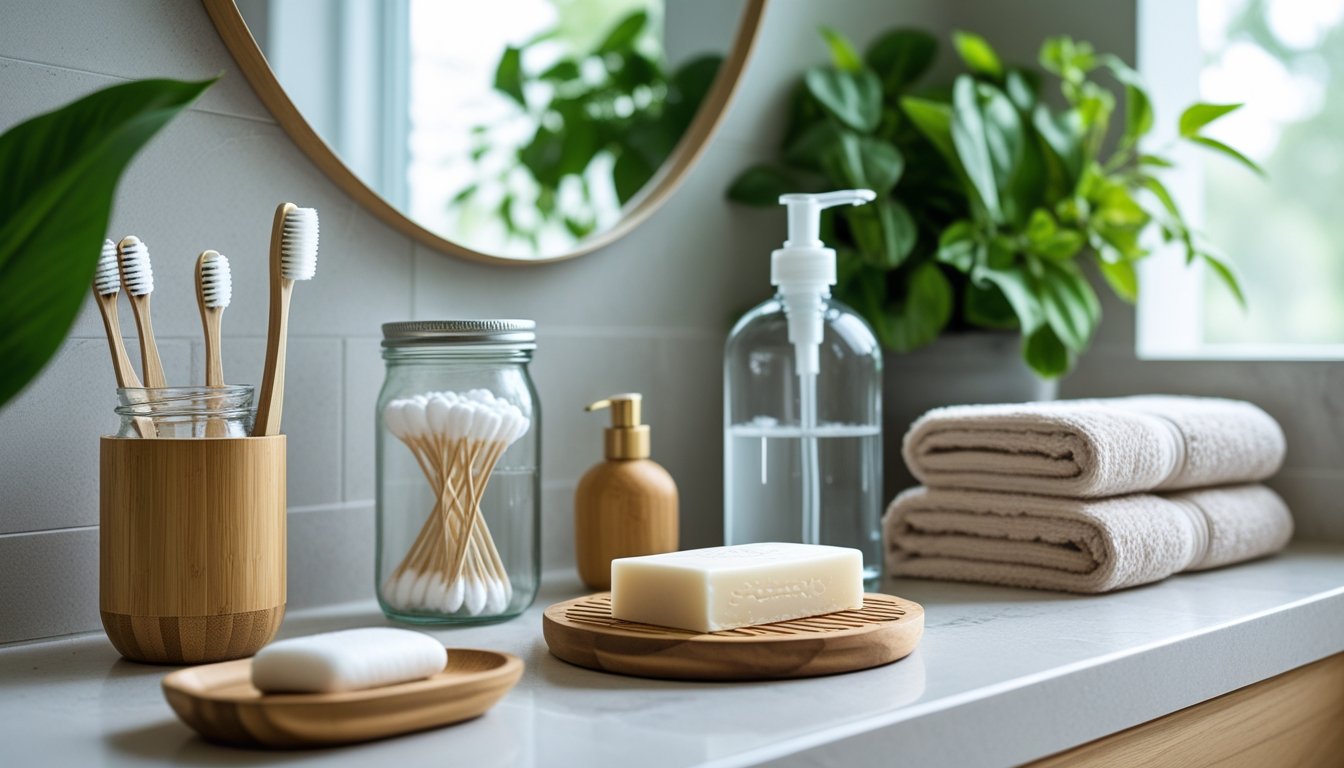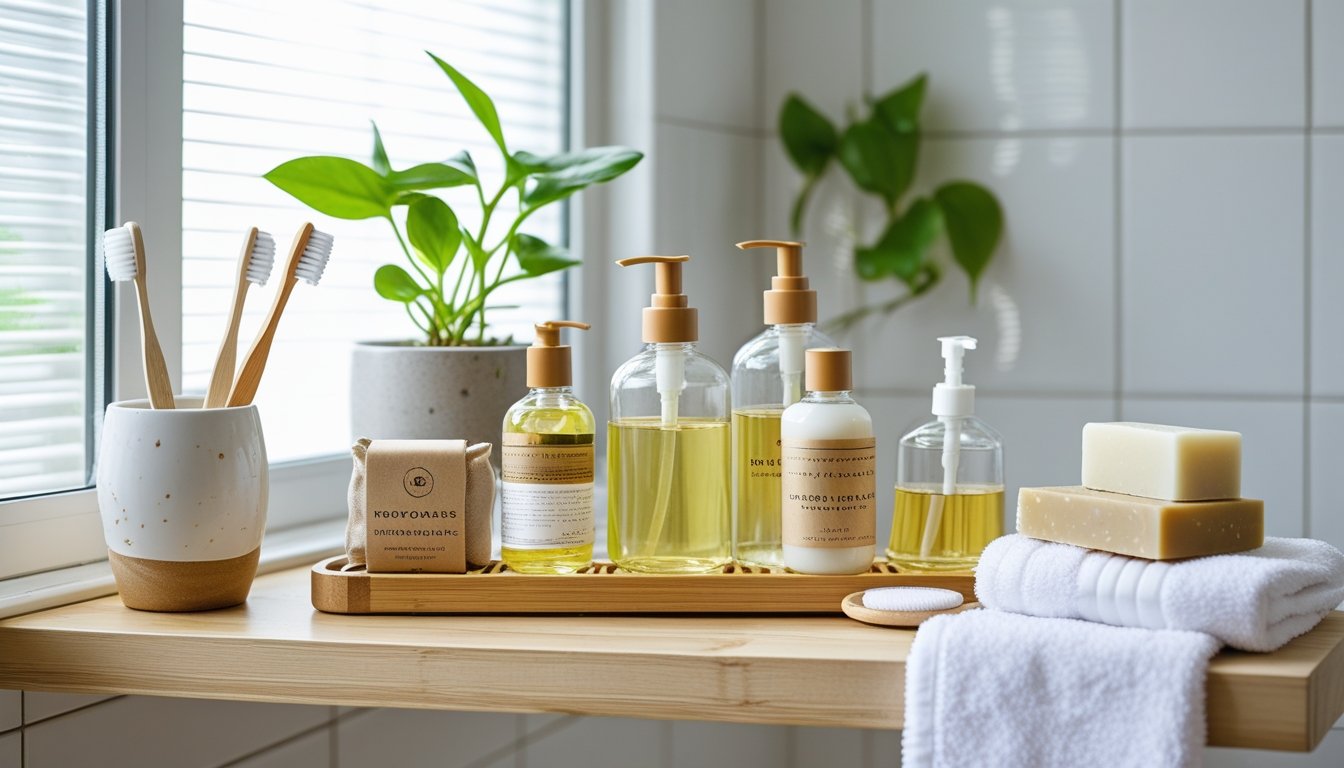Late updated: 07 Sep 2025 08:09
Written by: Sarah Hollister
How To Make Eco-Friendly Bathroom Products: A Comprehensive Guide
When we step into the realm of eco-friendly bathroom products, we're not just enhancing our personal spaces; we're making choices that matter. Creating your own eco-friendly bathroom products is an empowering way to contribute positively to the environment while enjoying healthier alternatives. By blending sustainable ingredients and simple DIY methods, we can transform our bathrooms into eco-conscious sanctuaries.

The journey involves exploring core principles such as reducing waste, using natural ingredients, and minimising plastic usage. Common swaps include homemade soaps, natural cleaning solutions, and biodegradable accessories. These changes not only benefit the planet but also often lead to an improved personal well-being.
Understanding the impact of our everyday choices allows us to address common concerns and misconceptions about eco-friendly living. Our goal is to provide you with practical and effective steps for making meaningful changes in your bathroom routine, paving the way for a more sustainable lifestyle.
Key Takeaways
- Create eco-friendly products with simple, sustainable ingredients.
- Explore bathroom swaps for reduced waste and plastic-free alternatives.
- Address frequently asked questions about eco-friendly bathroom habits.
Core Principles Of Eco-Friendly Bathroom Products

Eco-friendly bathroom products are pivotal in reducing environmental impact while promoting a healthier living space. Our focus is on eliminating plastic waste, embracing zero waste alternatives, and adopting essential sustainable product categories.
Reducing Plastic Waste In The Bathroom
Plastic waste is a critical issue in the modern bathroom. Single-use plastics like shampoo bottles, toothbrushes, and other toiletries contribute significantly to this problem. By replacing these with reusable or biodegradable materials, such as bamboo toothbrushes and refillable containers, we can reduce our plastic footprint.
Additionally, buying products in bulk or choosing items with minimal packaging can make a substantial difference. Implementing these changes not only benefits the environment but also aligns with a sustainable lifestyle, giving us the satisfaction of contributing positively to the planet.
Benefits Of Zero Waste And Plastic-Free Alternatives
The zero waste movement encourages reducing waste generation and opting for reusable options. In the bathroom, this translates into choosing products that are plastic-free and come with compostable or recyclable packaging.
Using solid soaps, shampoos, and conditioners without plastic encasements is both economical and eco-friendly. These alternatives eliminate pollution from single-use plastics and prevent harmful chemicals from entering our water systems. Moreover, these products often contain natural ingredients, making them healthier for us and the environment. Committing to zero waste not only aligns with ecological principles but often inspires broader changes in our lifestyles.
Essential Product Categories For A Sustainable Bathroom
Creating a sustainable bathroom involves rethinking various product categories. Key items include water-efficient fixtures like low-flow showerheads and dual-flush toilets, which minimise water wastage. Towel and cloth choices matter too; organic cotton or bamboo fabrics are both sustainable and pleasant to use.
In personal care, opting for refillable containers and natural, biodegradable ingredients in toiletries aligns with eco-friendly practices. We should also consider greener cleaning products that avoid harsh chemicals, supporting both ecological and personal health. By embracing these essential product categories, we can build a bathroom that champions sustainability at its core.
Popular And Effective Eco-Friendly Bathroom Swaps

Incorporating eco-friendly swaps into our bathroom routines can significantly reduce environmental impact. Simple changes, such as opting for bamboo toothbrushes and switching to bar-based haircare, can contribute to a greener lifestyle without sacrificing quality or convenience.
Switching To Bamboo Toothbrushes And Bamboo Toilet Paper
Bamboo toothbrushes are a popular eco-friendly choice due to bamboo's sustainable growth rate and biodegradable properties. Unlike plastic toothbrushes, which can take hundreds of years to decompose, bamboo toothbrushes break down much faster. Bamboo is also naturally antimicrobial, which adds another layer of hygiene.
Similarly, bamboo toilet paper is made from fast-growing bamboo plants and is both soft and strong. It offers an alternative to traditional toilet tissue, reducing the number of trees cut down for paper production. These swaps benefit both our planet and personal well-being. Opting for bamboo not only supports sustainable farming but also provides quality products that meet our daily needs.
Adopting Shampoo Bars And Conditioner Bars For Haircare
Shampoo bars and conditioner bars are gaining attention for their eco-friendly benefits and effectiveness. Unlike liquid products, these bars come with minimal packaging, often plastic-free, and last much longer than bottled alternatives. This not only cuts down on plastic waste but also reduces overall consumption.
Many brands offer bars made from natural ingredients, free from harmful chemicals like parabens and sulfates. They cater to diverse hair types and needs, ensuring that everyone can find a suitable option. Their compact size makes them ideal for travel, making it easier to maintain hair care routines while being eco-conscious.
Using Reusable Razors And Safety Razors
Replacing disposable razors with reusable or safety razors can significantly cut down on landfill waste. Safety razors, typically made from stainless steel, have a durable design, ensuring longevity and superior shaving experience. Unlike plastic versions, these razors only require blade replacement instead of entire units, reducing waste.
Reusable razors are cost-effective over time. Initially, they might seem like an investment, but they prove economical as users will only need to purchase blade refills. By choosing reusable razors, we contribute to a decrease in short-lived, single-use plastics and promote sustainable alternatives in our daily routines.
Alternatives Like Natural Loofah And Reusable Cotton Rounds
Natural loofahs, made from the fibrous skeleton of the loofah plant, offer a biodegradable option for body exfoliation. Compared to synthetic sponges, natural loofahs do not contribute to microplastic pollution. They are gentle on the skin and effective at cleansing, promoting healthier, more radiant skin.
Reusable cotton rounds provide a sustainable alternative to disposable cotton pads. Made from materials like bamboo or organic cotton, these rounds can be washed and reused multiple times. They are ideal for removing makeup or applying toners, contributing to a zero-waste lifestyle. By integrating loofahs and reusable cotton rounds, we can support our eco-conscious goals and maintain effective personal care routines.
Frequently Asked Questions

Our goal is to explore sustainable bathroom products and practices. We will cover essential aspects such as affordable eco-friendly alternatives, key materials for renovations, water conservation, and functional differences in eco-friendly toilets.
What are some sustainable alternatives to traditional bathroom toiletries?
Sustainable toiletries often include items like bamboo toothbrushes and shampoo bars instead of plastic products. These reduce plastic waste significantly. Similarly, toothpaste options that come in glass jars or powder form are gaining popularity. Refillable containers for soaps and lotions also ensure reduced single-use plastic consumption.
How can one create an eco-friendly bathroom on a budget?
To create an eco-friendly bathroom affordably, consider making small, impactful changes. Replace disposable cleaning wipes with washable cloths and switch to LED light bulbs for energy efficiency. Repurpose items when possible, and opt for multipurpose products like all-in-one body wash and shampoo. Every small change contributes to a greener bathroom.
Which materials should be considered for eco-friendly bathroom renovations?
When renovating, prioritise sustainable materials such as reclaimed wood, recycled glass, and bamboo. These materials have a lower environmental impact. For flooring, cork and recycled tiles are excellent options due to their durability and sustainability. Choosing paints with low volatile organic compounds (VOCs) also improves air quality.
What are the best practices for conserving water in the bathroom?
Water conservation is critical. Consider installing low-flow showerheads and taps, which can significantly cut down water usage. Dual-flush toilets help reduce water per flush. Fixing leaks and promoting shorter showers also save substantial amounts of water. Collecting greywater for non-potable uses is another effective strategy.
How do eco-friendly toilets differ from traditional ones in terms of functionality?
Eco-friendly toilets typically utilise dual-flush mechanisms, allowing different flush volumes. These significantly reduce water usage. Some models integrate bidet functions that lessen the need for toilet paper. Despite differences, the overall functionality remains similar to traditional toilets, ensuring convenience is not compromised.
Can you suggest any eco-conscious brands specialising in bathroom products?
Several brands are committed to sustainability, offering bathroom essentials. Companies like Etee and Zero Waste Club provide plastic-free personal care products. Meanwhile, brands like Who Gives A Crap deliver recycled toilet paper. Supporting these brands helps promote a sustainable approach to everyday bathroom habits.
